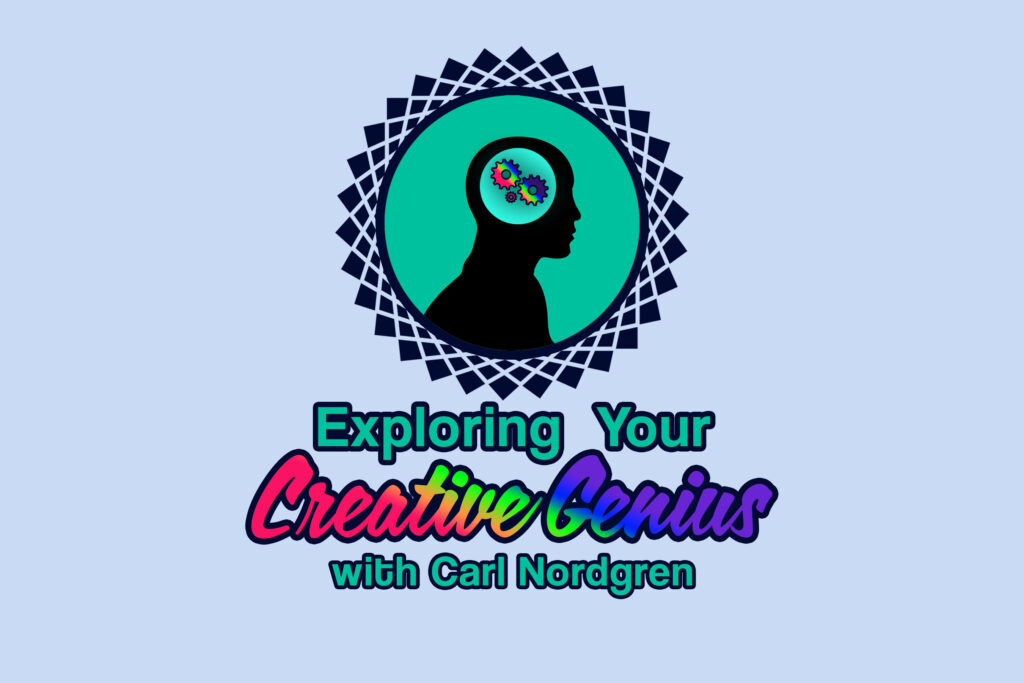I never believed the idea that creativity was for a gifted few. Throughout my life, as a teenage fishing guide, an entrepreneur and college professor, novelist, and creativity guide, the folks I’ve met are rich with creative and entrepreneurial qualities. My calling is to help you appreciate your creative genius so that it appreciates in value for you. Growing your creatively entrepreneurial genius is the best way to prepare for a future of unknowable unknowns, the best way to build careers we desire, the best way to fully appreciate life. I offer various perspectives on core creative and entrepreneurial concepts so you can construct the best path to your personal renewal and growth.
I wrote…
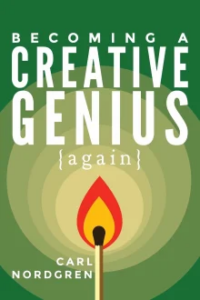 Becoming A Creative Genius (again)
Becoming A Creative Genius (again)
By Carl Nordgren
What is my book about?
Research NASA participated in found that 98% of us at age 4 perform on creativity assessments at levels NASA labels Creative Genius but by age 25 only 4% of us do. This book is the best of my courses taught to 2,000 Duke students to help them reclaim their creative genius—they do, having fun along the way.
As an entrepreneur I develop creative talent continuously; as a teacher, I study relevant neuroscience and social science research regularly; as a novelist, I explore personal creative habits; as a woods walker and animal husbandman, I live with natural creative forces. All those are sources for what I teach in a short book with a bias for action throughout.
The books I picked & why
Shepherd is reader supported. We may earn an affiliate commission when you buy through links on our website. This is how we fund this project for readers and authors (learn more).
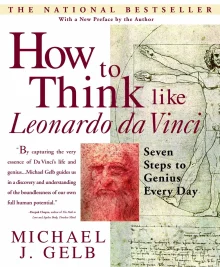 How to Think Like Leonardo Da Vinci: Seven Steps to Genius Every Day
How to Think Like Leonardo Da Vinci: Seven Steps to Genius Every Day
By Michael J. Gelb
Why this book?
This book had to be first. I’ve read three biographies about da Vinci, alert for clues into his brilliance. And I’ve never had a book recommended to me as frequently, by former students, colleagues, and friends. I’ve read it twice. Gelb draws on da Vinci’s notebooks and his work to shape The Seven da Vincian Principles—Curiosity, Being Sensual, Embracing Uncertainty, and Holistic Perspectives are my favorites—and also provides specific creative tips to help us live true to those principles in all aspects of our lives. I love da Vinci’s appreciation for what nature can teach us about being creative and this book captures that well.
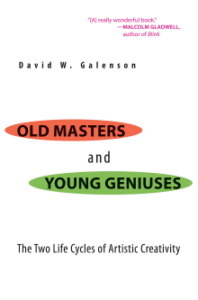 Old Masters and Young Geniuses: The Two Life Cycles of Artistic Creativity
Old Masters and Young Geniuses: The Two Life Cycles of Artistic Creativity
By David W. Galenson
Why this book?
How do creative people produce their best work? That’s the question Galenson researched as an economics professor leading to this book comparing the two major creative approaches he’s identified: Do they create by just getting started and through incremental efforts and continuous testing they feel their way until they discover what they will create? Or do they begin with careful and comprehensive plans of what they will create, beginning only when they are confident they have a full vision of what the end looks like? He studied artists—painters and poets, novelists and sculptors—but the questions he asks and the answers he frames are relevant to all creatively entrepreneurial work and he shares his thoughts about that as well. I love Cezanne’s paintings and was delighted to learn my creative process is similar to his.
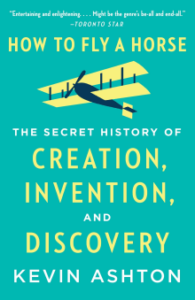 How to Fly a Horse: The Secret History of Creation, Invention, and Discovery
How to Fly a Horse: The Secret History of Creation, Invention, and Discovery
By Kevin Ashton
Why this book?
I used this in class the last semester I taught at Duke; had I continued to teach I would have used it again. The students and I found it was two things—as it tells the Secret History of Creation, Invention, and Discovery it also spotlights creative strategies and entrepreneurial behaviors in the stories it shares. It’s an entertaining history and narrative of creative and entrepreneurial successes; both teach us, guide us, maybe even inspire us. I’m the father of three daughters and appreciated the stories he’s uncovered of many life-changing innovations that women led but men claimed.
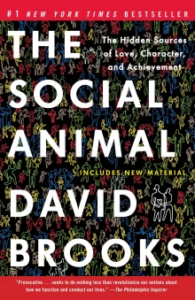 The Social Animal: The Hidden Sources of Love, Character, and Achievement
The Social Animal: The Hidden Sources of Love, Character, and Achievement
By David G. Brooks
Why this book?
I used this book in class for three semesters. The students were fans; I stopped using it only because I re-designed my classes regularly. It’s a deep dive into hundreds of social science and neuroscience research projects about how we relate to each other, how we want to engage with each other, and why. It first appeared to be an unusual pick for a class on creatively entrepreneurial growth but students agreed it made sense when reminded that most creative work is done in collaborative teams so understanding each other is of great creative benefit. Brooks uses fictional characters, a man and a woman, and tells their life stories, illuminating them with insights rooted in research; we see the deep human truths behind behaviors and are entertained along the way.
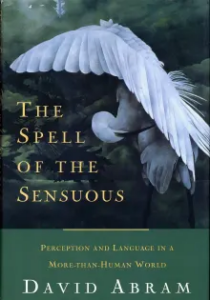 The Spell of the Sensuous: Perception and Language in a More-Than-Human World
The Spell of the Sensuous: Perception and Language in a More-Than-Human World
By David Abram
Why this book?
First and foremost we are sensual critters. At birth, our brains still have significant development to accomplish and focuses initially on the Sensory Control area since it’s vital for growth that we fully realize the messages and signals that the physical world is constantly sending. Here’s a poetic and philosophical exploration of how we emerged from and continue to be part of the physical sensual world. It makes sense it’s last. I’ve been reading it for two years without finishing; after a couple of pages of Abram’s beautiful wisdom about how, for instance, the first spoken languages were composed of natural sounds I need to put the book down and ruminate for a few days on the creative implications of my speaking and the sounds I make.
 “Exploring Your Creative Genius” takes an expansive view on what it means to be creative and entrepreneurial in an ongoing conversation led by Carl Nordgren — entrepreneur, novelist, and lifelong student with decades of experience growing his own creative capacity and assisting others to do the same in exciting new ways!
“Exploring Your Creative Genius” takes an expansive view on what it means to be creative and entrepreneurial in an ongoing conversation led by Carl Nordgren — entrepreneur, novelist, and lifelong student with decades of experience growing his own creative capacity and assisting others to do the same in exciting new ways!
You can also find more ways to explore your creative genius in this column’s companion radio program, broadcasting on 97.9 The Hill WCHL and posted here on Chapelboro!
Chapelboro.com does not charge subscription fees, and you can directly support our efforts in local journalism here. Want more of what you see on Chapelboro? Let us bring free local news and community information to you by signing up for our biweekly newsletter.

